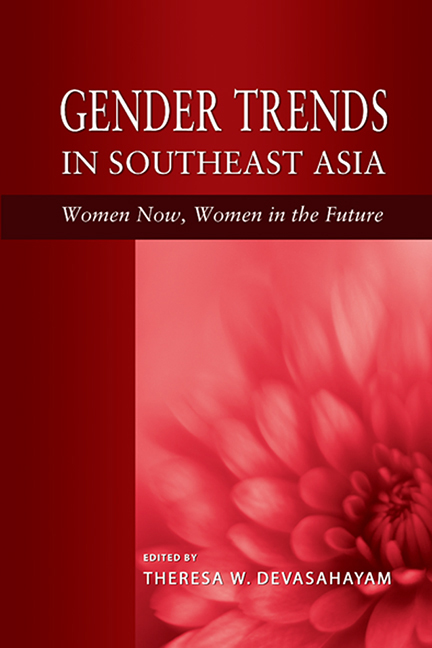Book contents
- Frontmatter
- Contents
- Contributors
- List of Tables and Figures
- Foreword
- Message
- Acknowledgements
- 1 Introduction: Women in Southeast Asia: Changes and Continuities
- 2 Women, Marriage and Family in Southeast Asia
- 3 Gender Trends in Migration and Employment in Southeast Asia
- 4 Has Gender Analysis been Mainstreamed in the Study of Southeast Asian Politics?
- 5 Gender Mainstreaming in Health: Mainstream or “Off-Stream”?
- 6 Politicization of Islam in Indonesia and Malaysia: Women's Rights and Inter-Religious Relations
- Index
6 - Politicization of Islam in Indonesia and Malaysia: Women's Rights and Inter-Religious Relations
Published online by Cambridge University Press: 21 October 2015
- Frontmatter
- Contents
- Contributors
- List of Tables and Figures
- Foreword
- Message
- Acknowledgements
- 1 Introduction: Women in Southeast Asia: Changes and Continuities
- 2 Women, Marriage and Family in Southeast Asia
- 3 Gender Trends in Migration and Employment in Southeast Asia
- 4 Has Gender Analysis been Mainstreamed in the Study of Southeast Asian Politics?
- 5 Gender Mainstreaming in Health: Mainstream or “Off-Stream”?
- 6 Politicization of Islam in Indonesia and Malaysia: Women's Rights and Inter-Religious Relations
- Index
Summary
INTRODUCTION
Global attention on what goes on in Muslim-majority countries has been keen since 11 September 2001. The perception is that civil and human rights are jeopardized when radical Islam is in control. Gender equality is also one of the more contentious elements of debates whenever Islam is forcefully asserted in society. In this chapter, I will try to give a balanced assessment on the development of Islam and the question of gender rights in the two Muslim-majority countries of Southeast Asia. The chapter will focus on some controversial developments with regard to the issuance of new regulations, laws and religious opinions (fatwa) that impact women and society in Indonesia and Malaysia. The general trend has been mixed since the number of legislations and policies which have tried to redress gender inequalities have increased, while at the same time legislative curbs on women's behaviour and freedom of expression have also equally multiplied. This chapter ends by suggesting that the institution of democracy needs to be kept alive so that a vibrant and civil atmosphere can be sustained for the exchange of dissenting views and opinions. Any resolution to the conflicts must also be worked out in ways that are democratic, consensual and legally binding.
Since this chapter seeks to compare two countries, Indonesia and Malaysia, it is also necessary to be cognizant of the historical and political similarities and differences between the two nations. While both countries project an assertive Islamic politics, it is also important to realize that there are pluralities and diversities within their societies that must be explicated in order to understand the dynamics of an evolving and, therefore, changeable state of Islamization in each country.
I will begin by giving a brief introduction to the background of Islamization in each country. The section brings out some of the differences in the process, in that in Malaysia it was a centralization exercise which strengthened Islamization in state and society and led to the observed trends discussed in this chapter.
- Type
- Chapter
- Information
- Gender Trends in Southeast AsiaWomen Now, Women in the Future, pp. 95 - 110Publisher: ISEAS–Yusof Ishak InstitutePrint publication year: 2009



